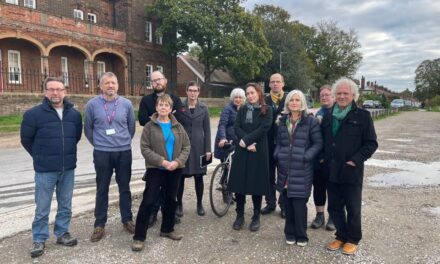How can you sleep at night in this weather? Norwich in the snow – photo © The Eye Snapper
–<<oo0oo>>–
The recent spell of very cold weather has brought the issue of homelessness into sharp focus in Norwich and in towns and cities across the country. When nobody ventures out unless they have no choice those left wandering the streets become more visible than ever. Their shivering requests for help have more urgency and impact.
Even the EDP has joined the debate, with an astonishingly shallow investigation that simply asks whether soup kitchens are making ‘the homeless issue’ worse. This depressing article makes no effort at all to address the causes of the ‘issue’, while glibly suggesting that handing out free soup may damage the reputation of the city. The author appears to see the solution in the hands of charities, naming the lobbying and advice charity Shelter as one of the ‘experts’. No analysis of how society’s attitudes or Government policy may be responsible for the symptoms of a heartless country.
Homelessness is not an inevitable fact, and can be addressed and largely eliminated. As a country we have pioneered effective solutions in years past.
The first step must be to actually address the often complex needs of those who either live on the streets or present as if they do, and this must include a genuine dialogue with those most affected to include their views and aspirations. Charity simply does not work, charity is all about satisfying the needs and choices of the giver, not the receiver. We need to return to a decent, caring society where housing is a right, not a market opportunity.
Successive recent governments have been dangerously obsessed with a right-wing free market approach to every task facing it. A series of public services have been privatised or marketed, including notorious recent failures such as the Forensic Service, Probation Service and the myriad tasks given to failing companies such as Carillion. Tory ministers are utterly obsessed with allowing a few rich individuals to harvest profit from any area of public service, however inappropriate. We have a skewed housing market where financial providers reap far greater rewards than anyone who actually builds homes. A shortage of supply helps to maximise price and profit for the few at the expense of miserable insecurity for the many, particularly young people.
After World War Two we achieved a consensus that we needed ‘homes for heroes’ to replace housing lost and degraded by warfare. Rent caps stopped private landlord speculation while a massive public sector building campaign brought good quality council housing, built to the admirable ‘Parker-Morris’ standards, to millions of people regardless of wealth or background.
This consensus was smashed by Thatcher’s government and all its successors, who allowed right-to-buy to decimate council stocks while systematically blocking new council house building. Prior to this Norwich City Council had a target of one thousand new homes a year, and achieved this level of provision.
Social housing was often handed to private sector housing associations who seldom allow input from tenants in management of their own homes and were encouraged to raise rents to ‘market’ levels, particularly during the Blair and Brown years.
If we are serious about preventing homelessness it is essential that we take housing supply away from an unregulated free market. An end (and in some cases reversal) of right-to-buy must be matched by a serious funding investment into council housing, by far the most cost effective means of home provision. Rent controls must be gradually re-introduced to moderate an out-of-control market that is hugely funded by the public sector in the form of housing benefit subsidy. All categories of people should have a statutory right to a home, not just families and people with complex needs but everyone, including single people of any age. The speculation and excess of the private rental market must be subject to rigorous price and quality standards, with long-term secure tenancies being created as the new normal.
Things that will make no difference at all include the Tory favourite of ever-weakening planning laws, allowing provision of sub-standard unsustainable homes against local community views. Attacking free-market developers for taking advantage of a free market will make absolutely no difference, yet even today the Prime Minister is repeating these tired and failed dogmas.
And let’s go back to where we started – those challenging, unattractive and in-your-face street beggars. Research shows the same conclusion as a conversation with these real people does – it is not a simple problem. Mental health services are widely failing people and street homeless people have a high incidence of mental health problems that are simply unaddressed. Benefit sanctions, lack of a fixed address and the vicious Tory attitude towards disabled people throw many people into desperate poverty, of which one of the more visible symptoms is street begging. The alternative too often is starving to an early death out of view.
As a community and society we should not be moaning about what appears unattractive in our rich and successful city, but taking responsibility for those we are failing. Where is your humanity and decency if you think homeless people simply need to be swept out of sight? Engaging with homeless people soon makes it clear that many end up on the streets by genuine mischance, with no option at all to prevent this fundamental indignity and hardship. So before you dismiss your responsibility remember that it could just as easily be you calling plaintively to passers by for some food or drink to eke out a few more hours of dangerous and short life.
By all means give money and food to alleviate immediate need, but please do not think that this absolves you of a duty to look at why we have allowed this cruel phenomenon to occur, and make sure you only vote in future for politicians that will address the causes of homelessness and not those who think a free market is the answer. Homelessness is your problem too.
© Julian Swainson 2018





Recent Comments